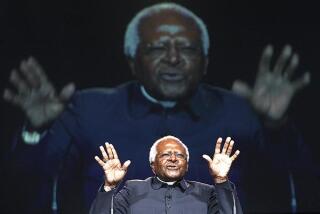Tutu Fears ‘Bloodbath’ in S. Africa : Warns That He May One Day Be Forced to Support Violence
- Share via
WASHINGTON — Bishop Desmond Tutu declared Sunday that it will take a miracle to prevent a “bloodbath” in South Africa and implied that he might some day be forced to support the violent overthrow of the country’s white-minority government.
Tutu, winner of the Nobel Peace Prize in 1984, who has emerged as the inspirational leader of blacks pressing for nonviolent change, also attacked President Reagan’s South African policies as “an unmitigated disaster for our people.” He suggested that the White House practice of soft-pedaling criticism of the regime of President Pieter W. Botha will backfire.
“When we become free, we will remember who helped us,” said the usually soft-spoken Tutu in a lilting tone that was in sharp contrast to his implied threat.
Foreign Minister Replies
Tutu’s gloomy forecast, made during an interview on CBS News’ “Face the Nation,” was rejected on the same program by South African Foreign Minister Roelof F. (Pik) Botha, who defended the major policy speech given by South Africa’s president last Thursday as evidence that the white leaders of his country are ready to upgrade the political status of blacks.
Critics of South Africa, both there and in the United States, have expressed frustration with what they saw as the combative tone and only vague promise of reform contained in President Botha’s speech.
But Reagan’s national security adviser, Robert C. McFarlane, in another Sunday television interview, urged South African black leaders to take up the offer to open negotiations and then press Pretoria’s authorities for specifics, rather than resort to violence.
Speaking from his Johannesburg home, Tutu stressed that he should not be mistaken as a “pacifist” just because he advocates nonviolence.
‘Which Is Lesser Evil?’
“I am sufficiently realistic to know that a time could come when you have to say here are two evils--injustice, oppression, exploitation--and the other evil--overthrowing this by an armed insurrection,” Tutu said. “Which is the lesser of two evils?”
Then, he added, “The church has a tradition which enables Christians to say there is a time when it is justifiable for Christians to overthrow an unjust government, but I hope we haven’t gone to there yet.”
Tutu said Botha’s speech left him with an unprecedented sense of foreboding. “I think we’re on the brink of catastrophe unless a miracle intervenes,” he declared. “I’m not using hyperbole. I’m scared. I still believe we (blacks) are going to be free, but I am fearful that we are going to get there--barring this miracle--through a bloodbath.”
Tutu characterized as “hypocrisy” and veiled racism the Reagan Administration’s “constructive engagement” policy, a formula of lobbying for racial change through persuasion rather than public criticism. “I think that that policy of constructive engagement is as evil, as immoral, as un-Christian as the policy that they are seeking to buttress--apartheid,” he asserted.
McFarlane, however, said on ABC’s “This Week with David Brinkley” that critics have misrepresented constructive engagement as a “slavish following” of whatever Botha’s government did, and he insisted that the policy has brought about positive change for blacks.
He acknowledged that the white president’s speech seems to have raised a “cloud” about the government’s intentions, but he suggested that black leaders could accomplish more by talking than fighting.
In his comments, Foreign Minister Botha declared that his president’s offer to open negotiations on reforms is a milestone indicating “that we have come to accept black participation.” But he warned that Congress would come to “regret” pending legislation imposing U.S. economic sanctions on South Africa as punishment for apartheid.
“What the United States Congress is, in effect, doing; its going to make it more difficult for a vast number--hundreds of thousands of black people--to earn money, to live, to eat, to survive,” he said.
A compromise version of the sanctions measure is now before the Senate and is considered almost certain to be passed when Congress ends its recess next month. The bill was enacted by the House on Aug. 1, after a conference between the two chambers.
More to Read
Sign up for Essential California
The most important California stories and recommendations in your inbox every morning.
You may occasionally receive promotional content from the Los Angeles Times.









